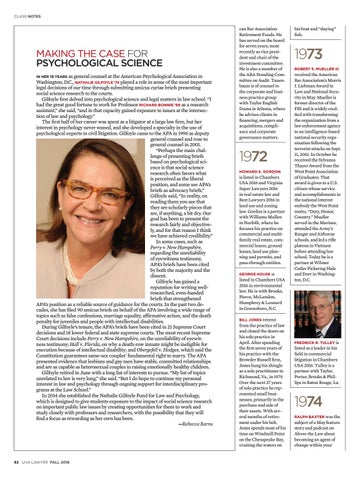CLASS NOTES
MAKING THE CASE FOR PSYCHOLOGICAL SCIENCE IN HER 19 YEARS as general counsel at the American Psychological Association in
Washington, D.C., NATHALIE GILFOYLE ’74 played a role in some of the most important legal decisions of our time through submitting amicus curiae briefs presenting social science research to the courts. Gilfoyle first delved into psychological science and legal matters in law school. “I had the great good fortune to work for Professor RICHARD BONNIE ’69 as a research assistant,” she said, “and in that capacity gained exposure to issues at the intersection of law and psychology.” The first half of her career was spent as a litigator at a large law firm, but her interest in psychology never waned, and she developed a specialty in the use of psychological experts in civil litigation. Gilfoyle came to the APA in 1996 as deputy general counsel and rose to general counsel in 2001. “Perhaps the main challenge of presenting briefs based on psychological science is that social science research often favors what is perceived as the liberal position, and some see APA’s briefs as advocacy briefs,” Gilfoyle said, “In reality, on reading them you see that they are scholarly pieces that are, if anything, a bit dry. Our goal has been to present the research fairly and objectively, and for that reason I think we have achieved credibility.” In some cases, such as Perry v. New Hampshire, regarding the unreliability of eyewitness testimony, APA’s briefs have been cited by both the majority and the dissent. Gilfoyle has gained a reputation for writing wellresearched, even-handed briefs that strengthened APA’s position as a reliable source of guidance for the courts. In the past two decades, she has filed 90 amicus briefs on behalf of the APA involving a wide range of topics such as false confessions, marriage equality, affirmative action, and the death penalty for juveniles and people with intellectual disabilities. During Gilfoyle’s tenure, the APA’s briefs have been cited in 21 Supreme Court decisions and 18 lower federal and state supreme courts. The most recent Supreme Court decisions include Perry v. New Hampshire, on the unreliability of eyewitness testimony; Hall v. Florida, on why a death-row inmate might be ineligible for execution because of intellectual disability; and Obergefell v. Hodges, which said the Constitution guarantees same-sex couples’ fundamental right to marry. The APA presented evidence that lesbians and gay men have stable, committed relationships and are as capable as heterosexual couples in raising emotionally healthy children. Gilfoyle retired in June with a long list of interests to pursue. “My list of topics unrelated to law is very long,” she said. “But I do hope to continue my personal interest in law and psychology through ongoing support for interdisciplinary programs at the Law School.” In 2014 she established the Nathalie Gilfoyle Fund for Law and Psychology, which is designed to give students exposure to the impact of social science research on important public law issues by creating opportunities for them to work and study closely with professors and researchers, with the possibility that they will find a focus as rewarding as her own has been. —Rebecca Barns
82 UVA LAWYER FALL 2016
can Bar Association Retirement Funds. He has served on the board for seven years, most recently as vice president and chair of the investment committee. He is also a member of the ABA Standing Committee on Audit. Tanenbaum is of counsel to the corporate and business practice group with Taylor English Duma in Atlanta, where he advises clients in financing, mergers and acquisitions, compliance and corporate governance matters.
1972 HOWARD E. GORDON
is listed in Chambers USA 2016 and Virginia Super Lawyers 2016 in real estate law and Best Lawyers 2016 in land use and zoning law. Gordon is a partner with Williams Mullen in Norfolk, where he focuses his practice on commercial and multifamily real estate, commercial leases, ground leases, land use planning and permits, and pass-through entities. GEORGE HOUSE is listed in Chambers USA 2016 in environmental law. He is with Brooks, Pierce, McLendon, Humphrey & Leonard in Greensboro, N.C.
his boat and “slaying” fish.
1973 ROBERT S. MUELLER III
received the American Bar Association’s Morris I. Liebman Award in Law and National Security in May. Mueller is former director of the FBI and is widely credited with transforming the organization from a law enforcement agency to an intelligence-based national security organization following the terrorist attacks on Sept. 11, 2001. In October he received the Sylvanus Thayer Award from the West Point Association of Graduates. That award is given to a U.S. citizen whose service and accomplishments in the national interest embody the West Point motto, “Duty, Honor, Country.” Mueller served in the Marines, attended the Army’s Ranger and Airborne schools, and led a rifle platoon in Vietnam before attending law school. Today he is a partner at Wilmer Cutler Pickering Hale and Dorr in Washington, D.C.
BILL JONES retired
from the practice of law and closed the doors on his solo practice in April. After spending the first seven years of his practice with the Browder Russell firm, Jones hung his shingle as a solo practitioner in Richmond, Va., in 1979. Over the next 37 years of solo practice he represented small businesses, primarily in the purchase and sale of their assets. With several months of retirement under his belt, Jones spends most of his time on Windmill Point on the Chesapeake Bay, cruising the waters on
FREDRICK R. TULLEY is
listed as a leader in his field in commercial litigation in Chambers USA 2016. Tulley is a partner with Taylor, Porter, Brooks & Phillips in Baton Rouge, La.
1974 RALPH BAXTER was the
subject of a May feature story and podcast on Above the Law about becoming an agent of change within your
